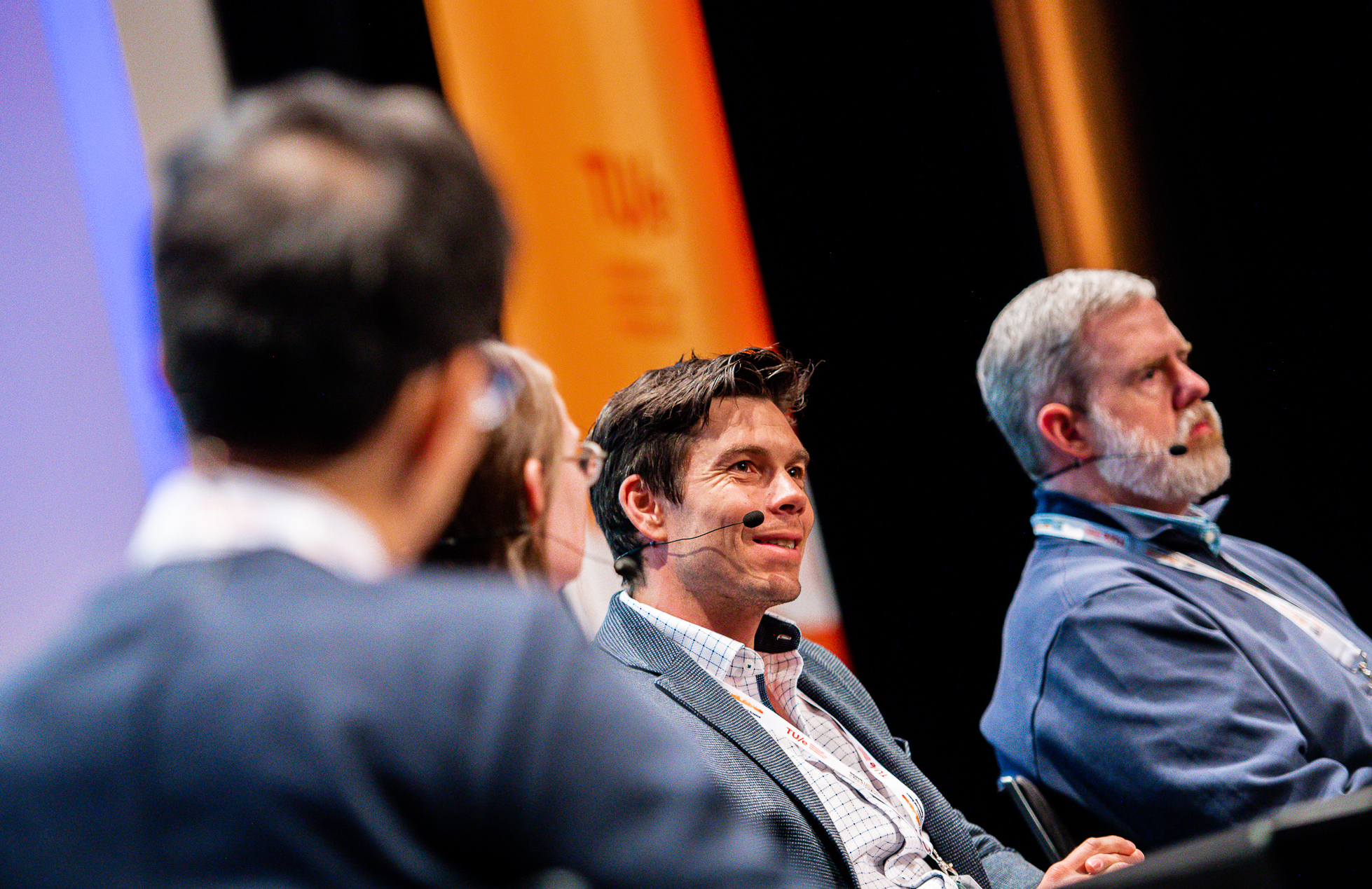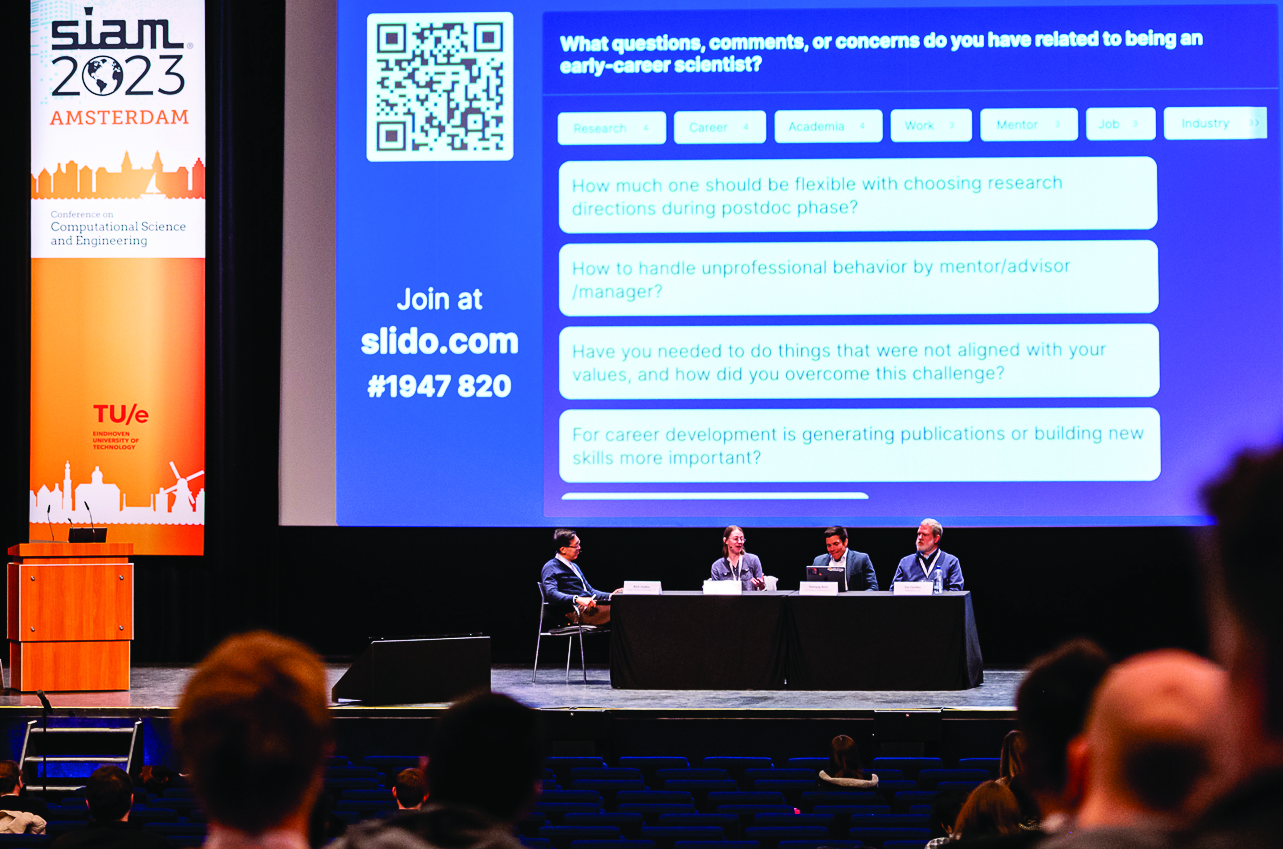Early-career Panel at CSE23 Explores Strategies for Healthy Career Advancement
Regardless of whether one is anticipating a future in academia, industry, or government, graduating students and early-career researchers typically focus all of their energy on the immediate next step of their professional journey: getting a job. But securing employment is only a small part of the larger process of navigating career responsibilities, preparing for strategic advancement, and maintaining a healthy work-life balance. During a panel discussion at the 2023 SIAM Conference on Computational Science and Engineering—which recently took place in Amsterdam, the Netherlands—Hartwig Anzt (University of Tennessee), Alicia Klinvex (U.S. Naval Nuclear Laboratory), and Pat Quillen (MathWorks) shared their personal experiences as junior scientists and offered advice to the forthcoming generation of applied mathematicians. Richard Vuduc (Georgia Institute of Technology) moderated the panel and stimulated a lively conversation on career goals and strategies. Attendees were able to actively participate in the session by asking questions firsthand or submitting their queries for the panelists via Slido.
The panelists opened the discussion by reflecting on some of their earliest career experiences. Klinvex commented that her first day in a “real” job at Sandia National Laboratories felt like an extension of her previous internship. Consequently, she initially struggled to differentiate her expectations and responsibilities as a postdoctoral researcher rather than an intern. “You figure those things out over time,” she said. “You have conversations; you don’t need to have it all figured out on the very first day."

Quillen accepted a job at MathWorks after earning his Ph.D. in mathematics and has remained there for the last 18 years. Prior undergraduate- and graduate-level internships at Sandia, Raytheon Technologies, and Honeywell International had introduced him to numerical linear algebra, provided opportunities to write software, and confirmed his desire to work outside of academia. The mathematical software industry thus seemed like a natural fit. “At MathWorks, I was able to essentially continue what I was doing in my Ph.D. but focus on product development instead of research,” Quillen said, adding that he was immediately tasked with fixing system bugs on his first day. “It was a little bit like being dumped into the deep end of the pool, but also pretty entertaining.”
When Vuduc asked the panelists how they prioritize when juggling multiple projects, Quillen admitted that he still has not fully mastered this skill. “The way I prioritize now is running from the most urgently burning thing to the next most urgently burning thing,” he quipped. He did, however, emphasize the importance of time management in industry settings, which are committed to delivering tangible products on a set timeline. Quillen encouraged listeners to split large projects into smaller, more manageable items. “You need to correctly identify hard deadlines versus softer deadlines and make sure that you’re advancing things that need to be advanced,” he said.
Anzt agreed that time management and attention to deadlines are critical in all employment areas. “You want to avoid running into the danger of doing all of the small things that are not super urgent,” he said. “They always fill up and you’ll never get to the important things.” In many cases, accurately identifying the most crucial tasks is a trial-and-error process. Klinvex therefore reminded attendees to ask colleagues and mentors for guidance, especially in a new position — doing so is not a failure, but rather an opportunity to grow.
Conversation then turned to mentorship. Anzt noted that one can and should have multiple mentors, each of whom serves a different purpose. For instance, a mentor in Anzt’s Ph.D. years helped him navigate the program, another taught him how to write strong papers during his postdoctoral period, and a third offered valuable career perspective. “The best advice I got was from a mentor and friend,” Anzt said. “An academic career is a marathon, not a sprint; be wise with your energy.”
Quillen seconded Anzt’s comments about mentor variety. MathWorks employs individuals with all types of backgrounds, and Quillen uses that to his advantage. “Mentors come in all shapes and sizes, as does advice,” he said. “Look for people who can teach you how to communicate your work.” Because industry employees frequently collaborate with individuals whose expertise might not match their own, learning to craft compelling stories and deliver strong presentations is incredibly beneficial.
Klinvex shared one of the most valuable skills that she learned from a mentor: how to say “no.” She cautioned that some people might try to take advantage of new graduates by asking them to undertake additional tasks that might not be appropriate for their level of expertise. “Get comfortable saying ‘no’ to things that are not of your caliber,” Klinvex said, disclosing that she rehearsed doing so before putting it into practice. “The first time I said ‘no,’ it felt really gross. It surprised the person I said ‘no’ to, and it surprised me as well.” The panelists all agreed that junior scientists can professionally reject a request by explaining that they do not have the time or capacity to sufficiently complete it.
Vuduc then directed the discussion to the challenge of attaining a healthy work-life balance. Quillen encouraged attendees to take control of their personal lives. “One of the things that really helped my work-life balance was removing email from my phone,” he said. “That has been extremely important to my personal mental health. If you’re at a place where you feel like you can’t do that type of thing, maybe it’s time to evaluate whether that place is good for you.” Quillen mentioned that all companies, laboratories, and employers have their own distinct cultures; what might be suitable for one individual will not necessarily benefit another.

Klinvex knew that she wanted a job that allowed time for family and facilitated a distinct separation between work and home life. She was thus drawn to her current position at the Naval Nuclear Laboratory because she cannot take work home with her. “Different jobs have different expectations, and I purposefully selected a job where the expectation was to work onsite for 40 hours a week,” she said.
Anzt recommended that everyone carve out time during the workday to step away and clear their minds, irrespective of workload. For instance, he commits to going for a walk, run, or quick swim during lunch every day. Though it is tempting to make exceptions to this designated break time, Anzt finds that doing so almost guarantees its eventual collapse. “Fighting for work-life balance is an everlasting battle,” he said. “It’s important not to give in.”
Next, an audience member inquired about the feasibility of transitioning between different research subjects. Anzt commented that making this switch is absolutely possible; in fact, some researchers pursue completely new fields after earning their Ph.D.s or completing postdoctoral positions. Quillen agreed and stated that he does not necessarily look for individuals with Ph.D.s in a particular subject during the hiring process. Because he and his MathWorks colleagues often switch applications and contexts depending on the development project at hand, the particular focus areas of prospective employees are less significant than their critical thinking abilities. “The purpose of your education is to teach you how to think and be adaptable to solve the kinds of problems that we have now,” Quillen said. “Learn to be flexible; this will make you valuable and fulfilled as well.”
When asked about the transition from a research-based role to a managerial position, Quillen—whose official title at MathWorks is “Software Engineering Manager”—urged attendees to refrain from micromanaging tendencies that slow progress. “It’s important to learn to let go,” he said. “It can be hard to recognize that people may not do exactly what you would have done, but it’s still just as effective.” New managers must acknowledge that they cannot maintain the same level of research and attention to detail as before.
Another essential aspect of management is coaching. “When exercising the coach muscles, try to understand where the person is and what type of coaching they need,” Quillen said. He noted that business books and other professional resources can be surprisingly helpful, especially since coaching and mentoring more junior coworkers is not necessarily an innate skill.
The panel concluded with several thoughts about the importance of routinely checking in with oneself and evaluating both personal and professional goals. “You need to visualize what you need for your life and decide if your job is compatible with that,” Klinvex said, adding that she prefers a structured professional schedule to stay on track. Goal setting influences future trajectories, and Quillen encouraged the audience to establish reasonable goals and take consistent steps towards them. Every job will occasionally include undesirable tasks in the short term, so constant reevaluation and self-reflection is vital to the complete assessment of one’s larger career picture. “It’s not so much about how much work there is, how much you’re doing, or how much is enough,” Quillen said. “It depends on how it makes you feel. You need to know yourself—or at least learn to know yourself—so that you can do your best in situations that allow you to do your best work.”
Interested in learning more about possible career paths in the mathematical and computational sciences? SIAM’s recently updated “Careers in the Mathematical Sciences” brochure features more than 20 new profiles of applied mathematicians, with a specific focus on industrial careers. The brochure is freely available online and can be purchased at the SIAM Bookstore.
Additionally, the SIAM Job Board offers job seekers and employers a unique and easy way to connect. Visit jobs.siam.org to browse available positions or advertise your organization’s openings.
About the Author
Lina Sorg
Managing editor, SIAM News
Lina Sorg is the managing editor of SIAM News.

Stay Up-to-Date with Email Alerts
Sign up for our monthly newsletter and emails about other topics of your choosing.



